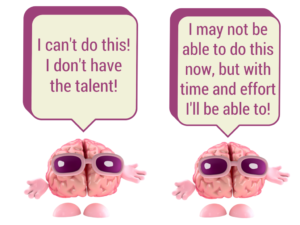Fixed Mindset or Growth Mindset?
Last week I wrote about the numerous benefits of having a child assessed and finding out how his/her brain works. (See: Why Does it Seem So Many Children Have a Diagnosis These Days?) As stated in my article, I truly believe in assessment, however, one has to take great care in how this information is then presented to the child. It’s extremely important that a diagnosis does not become a crutch.
Carol Dweck, Ph.D., is a famous researcher in the field of motivation and Professor of Psychology at Stanford University. Her research has focused on why people succeed and how to foster success. She is also the author of the excellent book, Mindset: The New Psychology of Success. She has described the two “voices” in our head as the “Fixed Mindset” voice and the “Growth Mindset” voice. When we are optimistic and trust that we can learn a new skill, handle a new situation, or learn new information, we are in a place of growth mindset. When we are pessimistic and fear that we might fail, or we shouldn’t try because it will be no use, we come from a fixed mindset.
After seven experiments with hundreds of children, we had some of the clearest findings I’ve ever seen: Praising children’s intelligence harms their motivation and it harms their performance. How can that be? Don’t children love to be praised? Yes, children love praise. And they especially love to be praised for their intelligence and talent. It really does give them a boost, a special glow—but only for the moment. The minute they hit a snag, their confidence goes out the window and their motivation hits rock bottom. If success means they’re smart, then failure means they’re dumb. That’s the fixed mindset.”
― Carol S. Dweck, Mindset: The New Psychology of SuccessIf parents want to give their children a gift, the best thing they can do is to teach their children to love challenges, be intrigued by mistakes, enjoy effort, and keep on learning. That way, their children don’t have to be slaves of praise. They will have a lifelong way to build and repair their own confidence.”
― Carol S. Dweck, Mindset: The New Psychology of Success
How Do We Explain to a Child How His/Her Brain Works from a Growth Mindset Perspective?
I believe children need to know how their brain works in order that they don’t think they’re “stupid”, or “helpless”. It can be a huge relief for them to know that, for example, the letters on a page jump around because of the way their brain is wired vs. their level of intelligence. For a child with anxiety, it can be very comforting to know that the “worry dragons” have found a way to become the boss, but that they can get their power back. These factors which make their lives challenging are impacting them, but do not create their identity. This reminds me of the title of the empowering children’s film, I Have Tourette’s But Tourette’s Doesn’t Have Me. Imagine filling in your child’s challenge here: “I have ADHD, Anxiety, a learning disability, (etc.) but it doesn’t have me.”
The Key Points:
- We all have strengths and we all have challenges. Brainstorm with your child what are his/her strengths and challenges. Explain yours
- Brain scientists have now discovered that our brains are always growing – this is called neuroplasticity. If we keep practicing we can make progress
- Many successful people experienced failure first. Give examples such as Michael Jordan who, at first, did not it make it onto his university basketball team. Thomas Edison, inventor of the light bulb, who in school was described as having a mind that was confused and wandered, and he also became hearing impaired. Sir Richard Branson, successful business man with Dyslexia, who left school at age 15yrs. and couldn’t make sense of math. Helen Keller, who was deaf and blind but learned to read lips, read Braille, speak and she was the first deaf-blind person to earn a Bachelor of Arts degree
- Focus on small wins as evidence for progress
- Comment on effort vs. judgmental praise (See my previous article on Praise vs. Encouragement – Report Cards, How Do You Respond?)
- Model the value of the learning process, including the importance of mistakes as an opportunity to learn
- Teach that a Learning Disability is a learning style difference (See this excellent article by David Flink: A Learning Problem is Not an Intelligence Problem)
- Externalize the challenge. For example, instead of saying someone is Autistic, we now say someone has Autism (or ASD/Autism Spectrum Disorder). ADHD can be described as ADHD energy (a Ferrari engine with drum brakes). Anxiety can be explained as sometimes having the “worries”.
- Model a growth mindset
- Introduce your child to the growth mindset computer program: Brainology
The 6 week Self-Empowerment groups that I run, which will be starting again after Spring break, teach many of the growth mindset skills. For more information, please see below.
Have a wonderful, optimistic week!
Warmly,
Want to Connect?
Subscribe now to receive free weekly parenting tips and inspiration.









One thought on “Growth Mindset or Fixed Mindset? How to Help Your Children Believe in Themselves No Matter What Their Challenges Maybe”
Comments are closed.